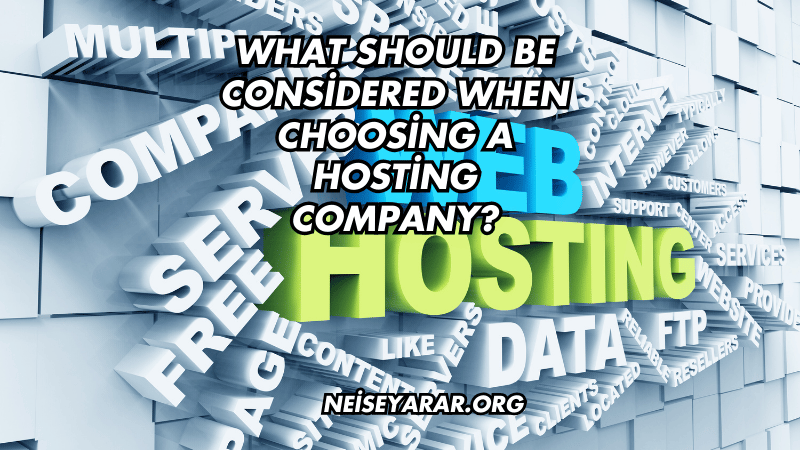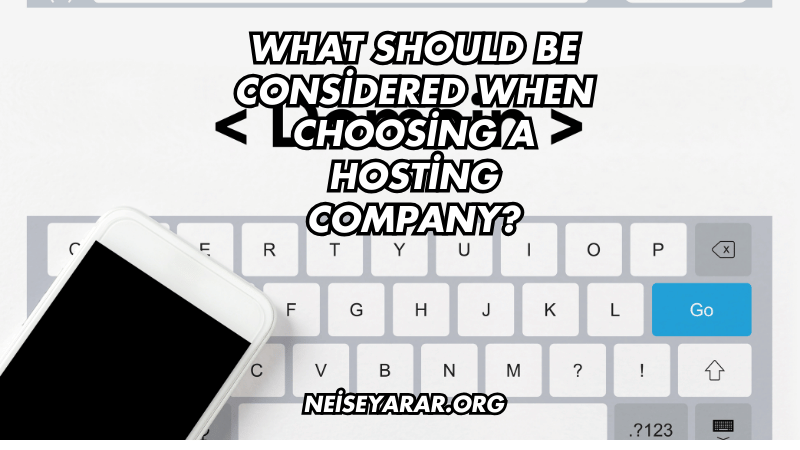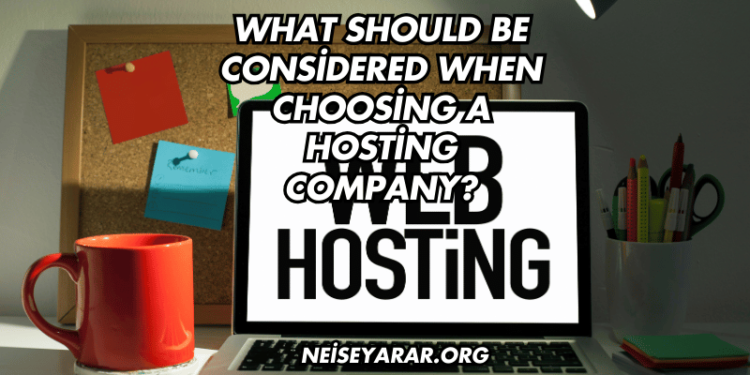Selecting the right hosting company is a crucial decision for anyone planning to launch a website. Your hosting provider plays a pivotal role in the success of your online presence, affecting factors such as website performance, security, and scalability. In this article, we’ll explore the key considerations when choosing a hosting company to ensure your website thrives in today’s competitive digital landscape.
What Should Be Considered When Choosing a Hosting Company?
Before diving into the factors to consider, it’s essential to understand what hosting is and why it matters. Web hosting refers to the service that allows individuals and organizations to make their websites accessible on the internet. Hosting companies provide the technology, resources, and infrastructure needed to store and deliver your website’s files to users. The quality of your hosting impacts your website’s speed, uptime, and user experience, making it a critical choice for businesses, bloggers, and developers alike.

Factors to Consider When Choosing a Hosting Company
There are several important factors to evaluate when selecting a hosting provider. Each of these aspects plays a role in determining whether a hosting company aligns with your needs and goals.
Server Uptime and Reliability
One of the most critical factors is server uptime, as it directly impacts your website’s availability. A reliable hosting provider should guarantee at least 99.9% uptime, ensuring that your site remains accessible to visitors without frequent disruptions. Downtime not only frustrates users but can also harm your search engine rankings.
Speed and Performance
Website speed is essential for delivering a positive user experience and maintaining high search engine rankings. Choose a hosting provider that offers fast servers, Content Delivery Networks (CDNs), and SSD storage to ensure optimal performance. Faster websites lead to higher engagement, lower bounce rates, and improved conversions.
Security Features
Security is a top priority, especially if your website handles sensitive data like customer information or online payments. Look for hosting companies that provide robust security features, such as SSL certificates, regular malware scans, firewalls, and automatic backups. These measures protect your website from potential threats and data breaches.

Scalability Options
As your website grows, so will its resource requirements. It’s essential to select a hosting provider that offers scalable plans to accommodate your increasing traffic and storage needs. Whether you start with shared hosting or a VPS, the ability to upgrade seamlessly is vital for long-term success.
Customer Support
Responsive and knowledgeable customer support can save you time and frustration when technical issues arise. Opt for a hosting provider that offers 24/7 customer support through multiple channels, such as live chat, email, and phone. A strong support team ensures that you get assistance whenever you need it.
Hosting Types and Plans
Different websites have different hosting requirements. Evaluate the types of hosting offered, such as shared, VPS, dedicated, or cloud hosting, and choose a plan that aligns with your website’s needs and budget. Each type has its advantages and drawbacks, so understanding their differences is crucial.
Pricing and Value for Money
While cost is an important factor, it shouldn’t be the sole determinant. Compare hosting plans to find a balance between affordability and features. Be cautious of hidden fees and ensure the hosting provider delivers value for the price you pay.
Reviews and Reputation
Researching customer reviews and testimonials can provide valuable insights into a hosting company’s performance and reliability. Look for consistent positive feedback and avoid providers with a history of poor service or frequent outages.

Frequently Asked Questions
To address common concerns about choosing a hosting company, here are answers to frequently asked questions. These detailed responses aim to guide you in making an informed decision.
What is the best type of hosting for a new website?
For a new website, shared hosting is often the best option due to its affordability and ease of use. However, as your website grows, you may need to transition to VPS or cloud hosting to meet increased traffic and performance demands.
How important is server location when choosing a hosting company?
Server location impacts website speed, as data travels faster when the server is closer to the user. Choose a hosting provider with data centers near your target audience to ensure optimal performance and lower latency.
Can I switch hosting providers later if I’m not satisfied?
Yes, most hosting providers offer migration services to help you transfer your website to a new host. However, it’s essential to check if the new provider offers free migration support and ensure that the process minimizes downtime.
Are free hosting services a good choice?
Free hosting services may be suitable for hobby projects or small personal websites but often come with limitations, such as ads, limited storage, and lack of scalability. For professional websites, investing in paid hosting is a better choice.
What additional features should I look for in a hosting provider?
Look for features like one-click installations for CMS platforms (e.g., WordPress), email hosting, developer-friendly tools, and advanced analytics. These features can simplify website management and enhance your online presence.
By carefully evaluating these factors and understanding your website’s unique requirements, you can choose a hosting company that supports your goals and ensures long-term success.







